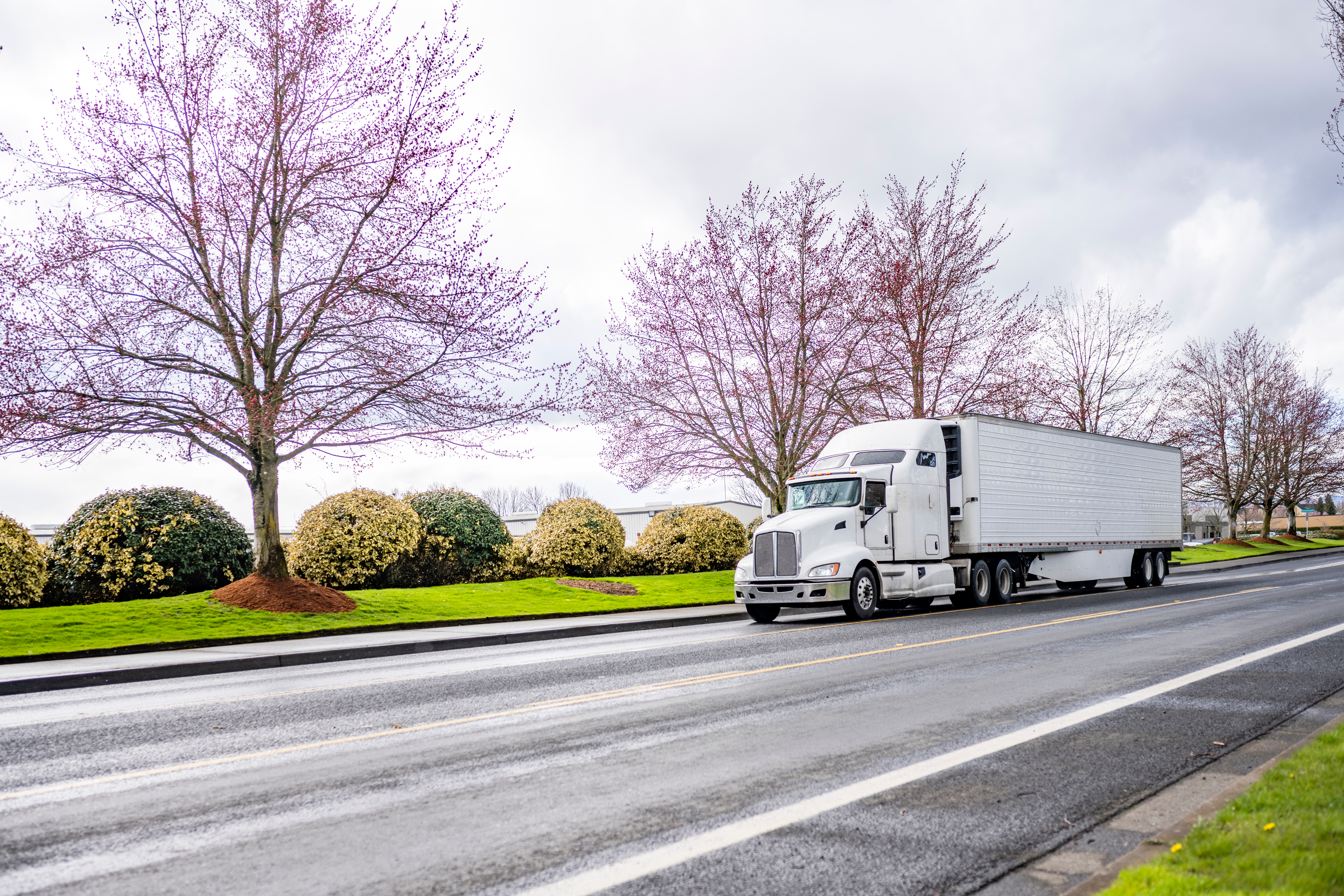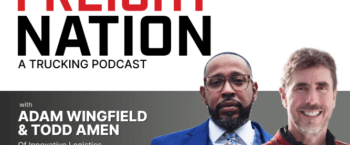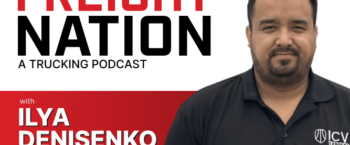How To Choose the Best Commercial Truck Insurance for New Drivers

What are you waiting for?
Make more money starting now.
Embarking on a commercial truck driving career requires careful preparation, especially regarding insurance. And finding the best commercial truck insurance for new drivers can be daunting. With many options and intricate details, it’s easy to feel lost but it’s necessary for protecting your journey ahead.
In order to help you simplify the process of choosing commercial truck insurance, we’ve outlined the importance of choosing suitable insurance, addressed common challenges, and provided practical advice to make it easier for new drivers.
To simplify choosing commercial truck insurance, we highlight its importance, address common challenges, and offer practical advice for new drivers.
What coverage do you need?
As you venture into commercial truck driving, you must understand the coverage available. Your specific role and equipment type can determine your insurance needs.
Role-specific basic coverage
The basic coverage by job role includes the following:
- Company Drivers need less comprehensive coverage, as they might not be responsible for equipment breakdown losses.
- Lease Owners-Operators should examine their lease agreements to identify what insurance is excluded and fill any coverage gaps.
- Owner-Operators with Authority need to secure all necessary coverage for their vehicles to comply with regulations and safeguard their operations.
Additional coverages
Beyond the different types of insurance based on role, there are some essential insurance coverages you may need as a new driver.
Here are some of the most common:
- Liability Insurance covers damages or injuries you cause to others. Most brokers mandate a minimum of $1,000,000 in liability coverage, though $750,000 may suffice, aligning with the Department of Transportation’s (DOT) minimum requirement.
- Physical Damage Coverage protects your truck against damage. Whether in case of theft or you’re at fault in an accident, the insurance ensures you can repair or replace your vehicle.
- General Liability Insurance is crucial for incidents that occur off the road, including loading and unloading. Companies often require policies offering $1,000,000 per accident and a $2,000,000 total limit.
- Motor Truck Cargo Insurance protects the goods you’re hauling in case they’re damaged during transit. The insurance ensures you can cover any claims for the cargo you’re responsible for.
- Refrigeration Breakdown Coverage covers losses caused by a malfunctioning refrigeration unit, safeguarding against spoilage claims.
- Trailer Interchange Insurance is needed if you’re swapping or renting trailers. This coverage protects against damages to these trailers under your care.
- Bobtail Insurance is vital when driving without a load. It covers personal or non-commercial use of your truck, a requirement by many companies for owner-operators.
- Umbrella/Excess Liability Insurance is not always required, but this supplementary coverage extends beyond your primary $1,000,000 liability, offering an extra layer of protection.
Factors affecting the cost of insurance
Unfortunately, there’s no one-size-fits-all regarding insurance prices for new truck drivers. Various factors can influence the cost of your insurance. Here’s a breakdown of the critical elements that can affect your insurance premiums:
- Driving History: Safe driving records, both non-commercial and commercial, can lead to lower premiums. Accidents and violations can increase rates.
- Type of Vehicle: Insurance costs are higher for heavy semi-trucks than for lighter vehicles due to repair or replacement costs.
- Operating Radius: Long-haul trucking operations often incur higher insurance costs due to increased risk.
- Location: The state you operate in can impact insurance rates due to different laws and risk levels.
- Storage: Secure storage locations for your truck can reduce the risk of theft and lower insurance costs.
- Cargo: Transporting hazardous or high-value goods can increase insurance premiums due to a higher risk of loss.
- Deductible: Higher deductibles can reduce monthly premiums but increase costs in the event of a claim.
- Amount of Coverage: Greater coverage levels result in higher premiums. Requirements may vary based on company contracts.
- Truck Age and Condition: Newer, well-maintained trucks are less prone to issues. This can lower insurance rates compared to older trucks.
- Safety Rating and Practices: A strong safety record and adherence to safety protocols can impact insurance rates.
Choosing the best insurance as a new truck driver
With many companies in the market offering truck driver insurance, it can be hard to understand where to start first and which one is right for you. Here are some tips to help you choose the best commercial truck insurance for new drivers.
Obtain multiple quotes
Don’t settle for the first insurance quote you receive. Get quotes from several carriers to compare costs and policy terms. Some insurers offer free online quotes, while others may require a call or a visit to a local agent.
Compare premiums vs. deductibles
Compare the monthly premiums and what each policy includes or excludes. Consider if a higher deductible, which can lower your monthly premium, is right for you. Be realistic about what you can afford out-of-pocket in case of an accident. Sometimes, paying more each month for a lower deductible can pay off in the long run.
Check availability in your state
Ensure the insurance company is licensed to operate in your state. Insurers’ availability can vary based on location, which can narrow your options.
Consider company reputation
Research the reputation of each insurer you consider. You’ll want to make sure the carrier you choose has a positive reputation. Look up online reviews and check their ratings with industry-standard companies like A.M. Best, Moody’s, and S&P Global for an insight into their financial stability.
Understand support and response times
Investigate how easy it is to contact the insurer’s support team and how responsive the service is. You should understand how to file a claim, the response times, and who to contact with questions. Many insurers offer 24/7 support, but service levels can vary.
Seek expert advice
If you’re still unsure of the best options after researching thoroughly, speak with an insurance expert who can explain your coverage options. They can help you understand the nuances of primary coverage, general liability, and additional endorsements that could enhance your protection.
Top commercial trucking insurance providers
As a new truck driver, you want to pick the best commercial truck insurance for new drivers that offers the greatest service. Here’s a look at some top insurance providers and their main cost factors, benefits, and drawbacks.
Progressive
- Main Cost Factors: USDOT authority, coverage types, vehicle and cargo types, operating radius, driving history.
- Benefits: Discounts for electronic logging device use, full upfront payment, and coverage bundling. Free online quotes and approval for new drivers. Competitive pricing.
- Drawbacks: Less personalized service due to company size. Some discounts may not apply to new drivers.
CoverWallet
- Main Cost Factors: Driving history, experience, cargo type, operating radius, truck type, coverage amount.
- Benefits: Insurance brokerage offering quotes from multiple insurers. Informative resources for selecting insurance. Option to mix and match policies. One-time payment for premiums from different insurers.
- Drawbacks: Customer service complexities are due to the intermediary role. Possible higher premiums due to brokerage commissions.
Nationwide
- Main Cost Factors: Truck type, driving history, driver experience, cargo type, distance traveled.
- Benefits: Specialty coverage options. High rankings by major rating agencies. Reputed customer service. Online quotes and specialized pricing for new drivers.
- Drawbacks: Purchase only through local agents. Not available in all states. Higher premiums and limited coverage for tractor trailers and semi-trucks.
State Farm
- Main Cost Factors: Truck type, driving history, driver experience, cargo type, distance traveled.
- Benefits: Largest U.S. vehicle insurer. Competitive rates for new drivers. Good customer service and discount opportunities.
- Drawbacks: No online quotes. Purchase through agents only. Does not offer cargo insurance.
Sentry Insurance
- Main Cost Factors: Truck type, driving history, driver experience, cargo type, distance traveled.
- Benefits: Specializes in commercial insurance. Flexible coverage for all drivers. Nationwide availability. Member of the American Trucking Association. Easy online payment and claims portal.
- Drawbacks: No online quotes. Only available through local agents.
Exclusions in commercial truck insurance
As a new truck driver, it’s important to understand that commercial truck insurance, while comprehensive, has its limits. There are situations and things that won’t be covered by your policy.
Here’s a guide to common exclusions:
Intentional damage
- Exclusion: Damage or injuries resulting from deliberate actions meant to harm another person or property.
- Implication: If damage is intentionally inflicted, the insurance will not cover the costs.
Other people’s property
- Exclusion: Damage to property that doesn’t belong to the insured, even if they are responsible for its care.
- Implication: Additional coverage might be needed if transporting other’s property since standard policies won’t cover damages.
Specific cargo types
- Exclusion: Certain cargo types, such as pharmaceuticals, jewelry, money, alcohol, live animals, and hazardous materials, are often excluded.
- Implication: Transporting these items requires specialized insurance policies such as livestock cargo or hazmat insurance for adequate coverage.
Damages beyond policy limits
- Exclusion: Any damage or expenses that exceed the policy’s maximum coverage limit.
- Implication: Costs that surpass the coverage limit will not be insured, though additional coverage can be purchased for high-value items or risky operations.
Additional Considerations for New Drivers
Getting commercial truck insurance as a new driver can be a hurdle.
Here’s why:
- Experience matters: Many insurers won’t even offer coverage to drivers with less than 2 years of experience behind the wheel of a commercial truck.
- Expect higher premiums: If you do find a company willing to insure you, prepare for a higher price tag compared to experienced drivers. This reflects the increased risk they see in insuring someone new.
Key considerations to help you get the best deal on your truck insurance.
- Shop Around: Don’t settle for the first quote you receive. Instead, shop around and compare insurance options from different providers. Some companies specialize or are more accommodating to new truck drivers
- Maintain a Clean Driving Record: This is one of the best ways to get better insurance rates. A record free of accidents, traffic violations, and other infractions demonstrates you’re a safe driver in the eyes of insurers, leading to lower premiums.
- Consider Higher Deductibles: Choosing a higher deductible can lower your monthly payments. This means you’ll pay more upfront if you need to make a claim, but it can save you on ongoing costs, making insurance payments more manageable.
Find the best commercial truck insurance for new drivers with Truckstop
As a new truck driver, getting insurance can be daunting. However, clarifying what coverage you need and the factors affecting the cost will help you decide. Make sure to do your research before choosing a truck insurance company, and take note of the different options to help you make the right choice. The right insurance company for someone else might not be for you.
If concerns about insuring your load are at the top of your mind, then consider Truckstop’s cargo insurance. It provides you with 24/7 direct access, real-time notifications, automated OFAC sanction screening, and automatic insured shipment reports. For more information, visit Truckstop.
FAQs
For new commercial truck drivers, essential insurance coverages include:
- Liability Insurance: Covers damages or injuries caused to others in an accident where you’re at fault.
- Physical Damage Coverage: Protects your vehicle against damage from accidents, theft, or other incidents.
- Motor Truck Cargo Insurance: Covers the goods you’re hauling in case they are damaged or lost during transit.
- Non-Trucking Liability (Bobtail Insurance): Provides liability coverage when driving the truck for non-business purposes.
- General Liability Insurance: Offers protection against various incidents, including injuries or damage on your business premises.
Top insurance providers for new commercial truck drivers include:
- Progressive: Known for a wide range of coverages and discounts, including for electronic logging device usage.
- CoverWallet: An insurance brokerage offering quotes from multiple insurers, allowing for easy comparison of policies.
- Nationwide: Offers specialty coverages with a strong customer service reputation, though unavailable in all states.
- State Farm: Recognized for competitive rates and good customer service, but does not offer cargo insurance.
- Sentry Insurance: Specializes in commercial insurance with flexible coverage options and nationwide availability.
Common exclusions include:
- Intentional Damage: Damage intentionally caused by the insured is not covered.
- Other People’s Property: Damages to property not owned by the insured, which might be in their care, are typically excluded.
- Specific Cargo Types: Certain cargo types, like hazardous materials or high-value goods, may not be covered under standard policies.
- Damages Beyond Policy Limits: Costs exceeding the policy’s maximum coverage limit are not covered.
- High-risk Activities: Activities like racing, demolition contests, or intentional harm are excluded.

Find out how our platform gives you the visibility you need to get more done.
Get helpful content delivered to your inbox.
Schedule a demo.
Find out how our platform gives you the visibility you need to get more done.





